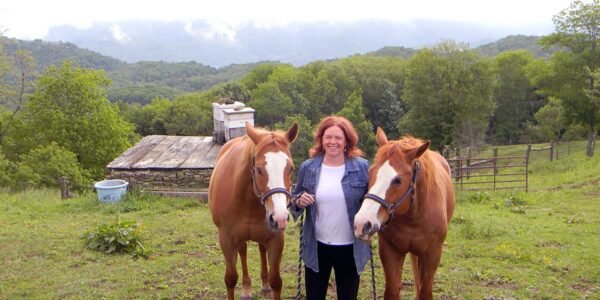Lee Rankin is the person behind Apple Hill Farm in Banner Elk, North Carolina, and a wonderful person, who I hope you’ll get to meet someday. She not only has the dream life of living on and running a farm, but Rankin also gets to meet tons of people from all over. That’s thanks to her growing agrotourism business which depends on fiber-producing mammals. She gave us a few minutes out of her busy schedule to talk about life before Apple Hill Farm, the kind of people it’s meant for, and her pursuits beyond this wonderful place to visit in the mountains of North Carolina.
Another reason to visit Apple Hill Farm is to be near some of our favorite fall hiking trails in North Carolina.
Lee Rankin from Apple Hill Farm
This post is part of our blog’s series on People who travel and originally appeared on our sister site NC Tripping. Featured image provided by Apple Hill Farm. All others were created by our very own Christina Riley.
Background
Carl Hedinger: What is Apple Hill Farm?
Lee Rankin: We are an agrotourism Alpaca Farm. First, we’re an alpaca farm. We raise alpacas and other fiber-producing animals (llamas and angora goats) and we’re open to the public doing agrotourism through educational tours of the farm. People can learn about what we do here at the farm, how we take care of the animals, how they work together on the farm, and their stories. Many of our animals are rescues who have stories about how they came to us and even stories during their time here. We show people the views from our farm and the fiber that we make from the animals.
Beginnings
CH: Why did you start Apple Hill Farm?
LR: I was living in Kentucky with my son and working as a writer. I had written a cookbook and I was out on tour. At the State Fair there, I met an alpaca and said, “Oh, this is what I want to do next! I want to raise alpacas!” I had come to the Banner Elk area twice for book signings and things started to shift into place. For a while, it was my little secret that I wanted to raise alpacas but eventually, it grew into this little dream of owning an alpaca farm. It was the perfect thing to do with a child because I was single and I was looking for something that I could do that included a child. So a farm was a perfect way to do that and create a community of its own. We moved here and I found a piece of property that I just knew I couldn’t say “no” to.
Pick up a copy of Lee Rankin’s Cookin’ Up a Storm. It’s a beautiful tribute to the woman who helped raise her, the food she created, and more!
Fun Animal Names
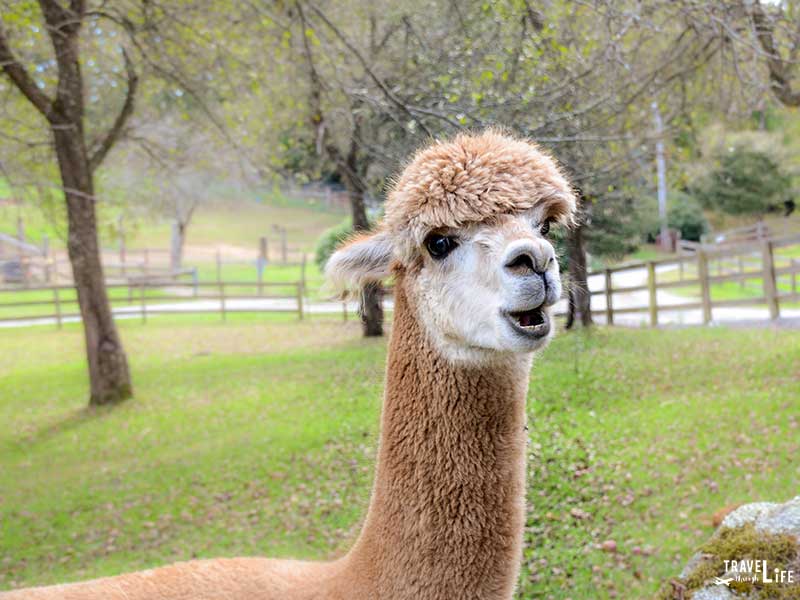
CH: How do you name your animals?
LR: We have a theme that we use with each group that we breed to help us name them. For instance, two goats we started with were named Dick and Jane. When Jane had babies, we went with storybook names and called them Hansel and Gretel. We have a goat named Shuggie and all of her babies have sugar-related names, like Cupcake, Sprinkle, Snow Cream, Pixie Stick, and more sweet names. It’s hard to remember all these names, so having a theme really helps. One of our alpacas is named Margarita so her babies are Tequila and Cuervo Gold. It helps us remember their names but it also sticks with people who visit us.
Who Should Visit Apple Hill Farm
CH: Who is the ideal person to come to Apple Hill Farm?
LR: The ideal person is a person who loves animals and benefits from being around animals. Our ideal customer of somebody who is living in the city and needs to take a break and wants to reconnect with something different. Between the animals, our spectacular view, and our amazing customer service I feel like we do that. We really let people step back in time to a place where there isn’t a rush. A place where there is a community of animals that work together with people who work as a family.
The Ideal Person
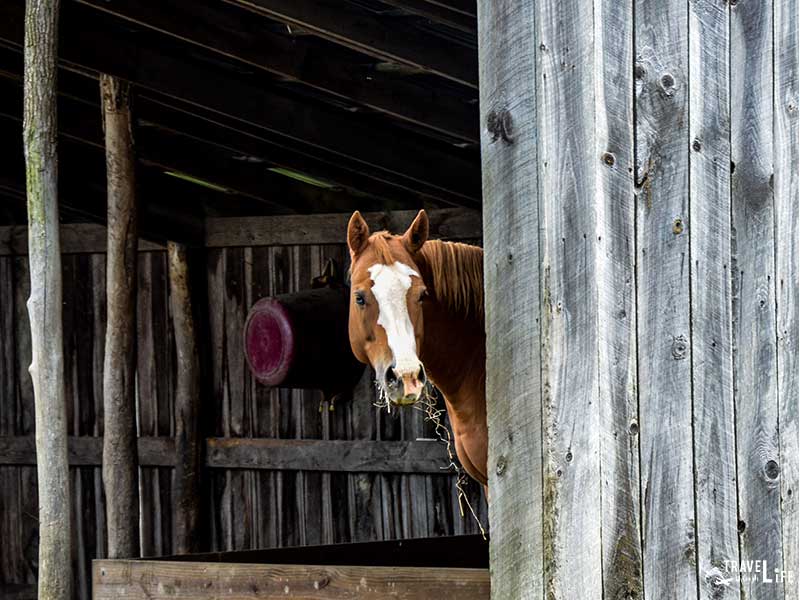
LR: For instance, we once had a little girl who had been in the hospital for a year not able to get out and go to the zoo. The first place that her family took her when she was finally released from the hospital was our farm. The gave her an alpaca sweater on the way as kind of a hint and we were their only destination. They even drove something like three hours to get to us. It was such a special moment for her and her family to be a part of our family and experience the love of the animals.
Challenges
CH: What kind of challenges did you have when you were first starting your business?
LR: The biggest challenge that we had, in the beginning, was the mountain lion attack. We had five alpacas in 2004 and a mountain lion attacked, where we lost four out of five of our alpacas. That was just six months after we had started and it was definitely the biggest threat to the business because we had to revamp everything. The state did not agree with us that it was a mountain lion, but we knew that it was. We saw the tracks so we knew that they lived here. The one thing that everyone agreed on was that whatever animal it was going to come back because they knew that we had food. After that, we added llamas to protect the inside and donkeys on the outside of the fence. We also added goats as an offering of food.
More Challenges
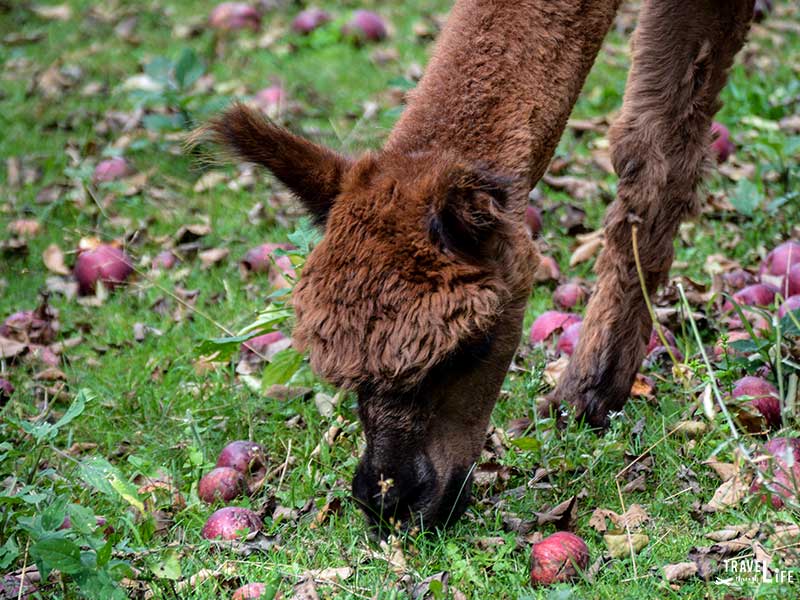
LR: Some other challenges that we face are the weather here. Some of the winters that we’ve had have been horrible. That might be our next big challenge is how to care for the animals that we have, in a location that we’re in when the weather is really bad. We have over 100 animals now. When the weather is below 10 degrees and we had 50 mph winds, the wind chill easily falls below 0. What can we do with the animals during this? We can try and move all of the animals into the barn, but then we aren’t able to keep all of the open water sources unfrozen. When it’s that cold a bucket of water will freeze solid in a matter of 12 hours, so it’s a lot of walking around the different barns and bringing fresh water.
When to Visit
CH: What’s your busiest time of year?
LR: July, October, and then depending on the weather and if people can get to us, between Christmas and New Years. During the Christmas time, a family of 10 might come to Banner Elk to ski for the week but only ski one or two days. So, they’re looking for something else to do. I feel like we’ve done a really good job at being able to meet the demands of so many people. We’re able to gauge sometimes by knowing if it’s a pretty day or if Banner Elk was really busy the night before to be ready with at least three tour guides for that early morning tour. We gradually found ways on how to handle people and I think that we’ve done an excellent job at it.
See more info about busy times and when Apple Hill Farm is open!
Life Outside of the Farm
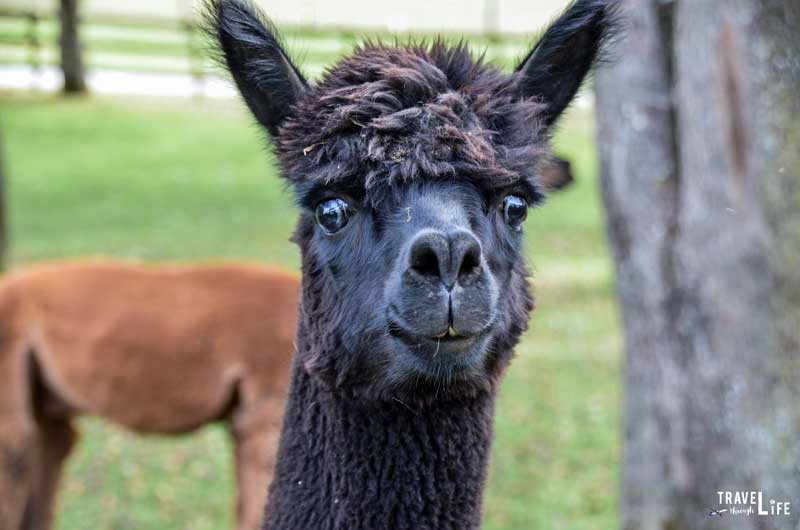
CH: Do you have any passions outside the farm?
LR: Writing is definitely still a passion of mine and I plan on writing a book. Also, the fiber side of alpaca farming has caught my attention. I’m really interested in teaching about fiber, so we’re looking right now on adding a couple of classes on Sundays during the winter time when are usually closed. Maybe one day we may move the store out of the barn and turn the barn more into a classroom setting. I get to do what I love, be with animals, be with people, and I get to play with fiber. I get to do so many incredible things and it’s my livelihood. And I get to include other people in it and it changes their lives.
Future Plans
CH: Do you have any plans to expand?
LR: We might. We moved fencing around the orchard before Christmas in 2017 so that we can make more space for parking because we have been using overflow parking at least one or two days a week. So we saw that as the time to do it before we got into our Christmas event. That’s when a lot of people come here at a lot of different times and be really busy. That way we are prepared for it. We also offer more tours then, so there is definitely a need for more parking.
Our Thoughts and Yours, Too!
Just before we let Lee go, she wanted to share her love for the state of North Carolina, it’s people, and the special place it holds in her heart. This pride in where she lives is a big part of the reason why we love traveling and also why we’ve started the People of NC at NC Tripping and the People who Travel series here. To me, it’s people like Lee are who make North Carolina what it is, and I can’t express enough gratitude to capture how thankful we are to have run into her.
What do you think about Lee Rankin, a person who’s doing what she loves and spreading joy to those who visit her business? Have you ever had the fortune of visiting Apple Hill Farm? We’d love to read your thoughts in the comments section.

